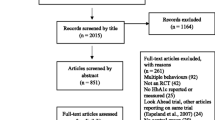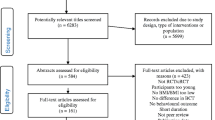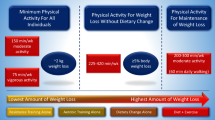Abstract
More than one-third of women in the United States are obese. This fact is of particular concern given that obesity contributes to increased risk of several diseases that affect women, including cardiovascular disease. Even modest weight loss, however, can prevent and improve cardiovascular risk factors in obese women. Behavioral interventions for the treatment of obesity that aim to produce weight loss via modification of diet and exercise habits appear to be particularly effective in this regard. This article summarizes research on the effects of behaviorally produced weight loss on cardiovascular risk, principal strategies to improve behavioral weight loss outcomes, and key components of successful long-term weight maintenance.
Similar content being viewed by others
References and Recommended Reading
Ogden CL, Yanovski SZ, Carroll MD, Flegal KM: The epidemiology of obesity. Gastroenterology 2007, 132:2087–2102.
Manson JE, Willett WC, Stampfer MJ, et al.: Body weight and mortality among women. N Engl J Med 1995, 333:677–685.
Flegal KM, Graubard PI, Williamson DF, Gail MH: Cause-specific excess deaths associated with underweight, overweight and obesity. JAMA 2007, 298:2028–2037.
Zalesin KC, Franklin BA, Miller WM, et al.: Impact of obesity on cardiovascular disease. Endocrinol Metab Clin North Am 2008, 37:663–684.
Gregg EW, Cheng YJ, Cadwell BL, et al.: Secular trends in cardiovascular disease risk factors according to body mass index in US adults. JAMA 2005, 293:1868–1874.
Schneider JG, Tompkins C, Blumenthal RS, Mora S: The metabolic syndrome in women. Cardiol Rev 2006, 14:286–291.
Visser M, Bouter LM, McQuillan GM, et al.: Elevated C-reactive protein levels in overweight and obese adults. JAMA 1999, 282:2131–2135.
Shoelson SE, Herrero L, Naaz A: Obesity, inflammation and insulin resistance. Gastroenterology 2007, 132:2169–2180.
Meyers MR, Gokce N: Endothelial dysfunction in obesity: etiological role in atherosclerosis. Curr Opin Endocrinol Diabetes Obes 2007, 14:365–369.
Clinical Guidelines on the Identification, Evaluation, and Treatment of Overweight and Obesity in Adults—The Evidence Report. National Institutes of Health. Obes Res 1998, 6(Suppl 2):51S–209S.
Knowler WC, Barrett-Connor E, Fowler SE, et al.: Reduction in the incidence of type 2 diabetes with lifestyle intervention or metformin. N Engl J Med 2002, 346:393–403.
Orchard TJ, Temprosa M, Goldberg R, et al.: The effect of metformin and intensive lifestyle intervention on the metabolic syndrome: the Diabetes Prevention Program randomized trial. Ann Intern Med 2005, 142:611–619.
Ratner R, Goldberg R, Haffner S, et al.: Impact of intensive lifestyle and metformin therapy on cardiovascular disease risk factors in the diabetes prevention program. Diabetes Care 2005, 28:888–894.
Haffner S, Temprosa M, Crandall J, et al.: Intensive lifestyle intervention or metformin on inflammation and coagulation in participants with impaired glucose tolerance. Diabetes 2005, 54:1566–1572.
Look AHEAD Research Group, Pi-Sunyer X, Blackburn G, et al.: Reduction in weight and cardiovascular disease risk factors in individuals with type 2 diabetes: one year results of the Look AHEAD trial. Diabetes Care 2007, 30:1374–1383.
Esposito K, Pontillo A, Di Palo C, et al.: Effect of weight loss and lifestyle changes on vascular inflammatory markers in obese women: a randomized trial. JAMA 2003, 289:1799–1804.
Selvin E, Paynter NP, Erlinger TP: The effect of weight loss on C-reactive protein: a systematic review. Arch Intern Med 2007, 167:31–39.
Wing RR: Behavioral approaches to the treatment of obesity. In Handbook of Obesity. Edited by Bray GA, Bouchard C. New York: Informa Healthcare; 2008:227–248.
Astrup A, Grunwald KG, Melanson EL, et al.: The role of low-fat diets in body weight control: a meta-analysis of ad libitum dietary intervention studies. Int J Obes Relat Metab Disord 2000, 24:1545–1552.
Dansinger ML, Gleason JA, Griffith JL, et al.: Comparison of the Atkins, Ornish, Weight Watchers, and Zone diets for weight loss and heart disease risk reduction: a randomized trial. JAMA 2005, 293:43–53.
Jeffery RW, Wing RR, Thornson C, et al.: Strengthening behavioral interventions for weight loss: a randomized trial of food provision and monetary incentives. J Consult Clin Psychol 1993, 61:1038–1045.
Wing RR, Jeffery RW, Burton LR, et al.: Food provision vs. structured meal plans in the behavioral treatment of obesity. Int J Obes 1996, 20:56–62.
Ditschuneit HH, Flechtner-Mors M, Johnson TD, et al.: Metabolic and weight-loss effects of a long-term dietary intervention in obese patients. Am J Clin Nutr 1999, 69:198–204.
Hannum SM, Carson L, Evans EM, et al.: Use of portion-controlled entrees enhances weight loss in women. Obes Res 2004, 12:538–546.
Cheskin L, Mitchell AM, Jhaveri AD, et al.: Efficacy of meal replacements versus a standard food-based diet for weight loss in type 2 diabetes: a controlled clinical trial. Diabetes Educ 2008, 34:118–127.
Jakicic JM, Wing R, Butler BA, et al.: Prescribing exercise in multiple short bouts versus one continuous bout: effects on adherence, cardiorespiratory fitness, and weight loss in overweight women. Int J Obes 1995, 19:893–901.
Jakicic J, Wing R, Winters C: Effects of intermittent exercise and use of home exercise equipment on adherence, weight loss, and fitness in overweight women. JAMA 1999, 282:1554–1560.
Andersen RE, Wadden TA, Bartlett SJ, et al.: Effects of lifestyle activity vs. structured aerobic exercise in obese women: a randomized trial. JAMA 1999, 281:335–340.
Dunn AL, Marcus BH, Kampert JB, et al.: Comparison of lifestyle and structured interventions to increase physical activity and cardiorespiratory fitness: a randomized trial. JAMA 1999, 281:327–334.
Richardson CR, Mehari KS, McIntyre LG, et al.: A randomized trial comparing structured and lifestyle goals in an Internet-mediated walking program for people with type 2 diabetes. Int J Behav Nutr Phys Act 2007, 4:59.
Tucker LA, Bagwell M: Television viewing and obesity in adult females. Am J Public Health 1991, 81:908–911.
Hu FB, Li TY, Colditz GA, et al.: Television watching and other sedentary behaviors in relation to risk of obesity and type 2 diabetes mellitus in women. JAMA 2003, 289:1785–1791.
Epstein LH, Valoski AM, Vara LS, et al.: Effects of decreasing sedentary behavior and increasing activity on weight change in obese children. Health Psychol 1995, 14:109–115.
Epstein LH, Paluch RA, Gordy CC, Dorn J: Decreasing sedentary behaviors in treating pediatric obesity. Arch Pediatr Adolesc Med 2000, 154:220–226.
Jeffery RW, Wing RR, Sherwood NE, et al.: Physical activity and weight loss: does prescribing higher physical activity goals improve outcome? Am J Clin Nutr 2003, 78:684–689.
Tate DF, Jeffery RW, Sherwood NE, et al.: Long-term weight losses associated with prescription of higher physical activity goals. Are higher levels of physical activity protective against weight regain? Am J Clin Nutr 2007, 8:954–959.
Jakicic JM, Marcus BH, Lang W, Janney C: Effect of exercise on 24-month weight loss maintenance in overweight women. Arch Intern Med 2008, 168:1550–1559.
Perri MG, Nezu AM, Patti ET, et al.: Effect of length of treatment on weight loss. J Consult Clin Psychol 1989, 57:450–452.
Perri MG, Shapiro RM, Ludwig WW, et al.: Maintenance strategies for the treatment of obesity: an evaluation of relapse prevention training and posttreatment contact by mail and telephone. J Consult Clin Psychol 1984, 52:404–413.
Wing RR, Jeffery RW: Benefits of recruiting participants with friends and increasing social support for weight loss and maintenance. J Consult Clin Psychol 1999, 67:132–138.
Tate DF, Wing RR, Winett RA: Using Internet technology to deliver a behavioral weight loss program. JAMA 2001, 285:1172–1177.
Tate DF, Jackovny EH, Wing RR: Effects of Internet behavioral counseling on weight loss in adults at risk for type 2 diabetes: a randomized trial. JAMA 2003, 289:1833–1836.
Tate DF, Jackovny EH, Wing RR: A randomized trial comparing human e-mail counseling, computer-automated tailored counseling and no counseling in an Internet weight loss program. Arch Intern Med 2006, 66:1620–1625.
Harvey-Berino J, Pintauro S, Buzzell P, Gold EC: Effect of Internet support on the long-term maintenance of weight loss. Obes Res 2004, 12:320–329.
Hunter CM, Peterson AL, Alvarez LM: Weight management using the Internet: a randomized controlled trial. Am J Prev Med 2008, 34:119–126.
Levy RL, Finch EA, Crowell MD, et al.: Behavioral interventions for the treatment of obesity: strategies and effectiveness data. Am J Gastroenterol 2007, 102:2314–2321.
Phelan S, Wyatt HR, Hill JO, et al.: Are the eating and exercise habits of successful weight losers changing? Obesity 2006, 14:710–716.
Wing RR, Papandonatos G, Fava JL, et al.: Maintaining large weight losses: the role of behavioral and psychological factors. J Consult Clin Psychol 2008, 76:1015–1021.
Author information
Authors and Affiliations
Corresponding author
Rights and permissions
About this article
Cite this article
Bond, D.S., Wing, R.R. Behavioral interventions for the treatment of obesity in women with or at risk for cardiovascular disease. Curr Cardio Risk Rep 3, 219–225 (2009). https://doi.org/10.1007/s12170-009-0034-7
Published:
Issue Date:
DOI: https://doi.org/10.1007/s12170-009-0034-7




